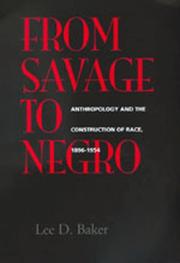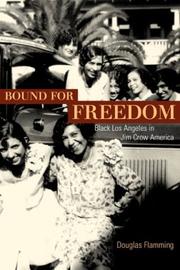| Listing 1 - 4 of 4 |
Sort by
|
Book
ISBN: 1282360752 9786612360756 0520942485 9780520942486 9780520256774 0520256778 9780520256781 0520256786 9781282360754 6612360755 Year: 2009 Publisher: Berkeley University of California Press
Abstract | Keywords | Export | Availability | Bookmark
 Loading...
Loading...Choose an application
- Reference Manager
- EndNote
- RefWorks (Direct export to RefWorks)
This is the untold story of a generation that experienced one of the most extraordinary chapters in our nation's history-school desegregation. Many have attempted to define desegregation, which peaked in the late 1970's, as either a success or a failure; surprisingly few have examined the experiences of the students who lived though it. Featuring the voices of blacks, whites, and Latinos who graduated in 1980 from racially diverse schools, Both Sides Now offers a powerful firsthand account of how desegregation affected students-during high school and later in life. Their stories, set in a rich social and historical context, underscore the manifold benefits of school desegregation while providing an essential perspective on the current backlash against it.
School integration --- Minority high school students --- 20th century american education. --- 20th century american history. --- american culture. --- american education system. --- american history. --- american politics. --- bonds. --- education. --- friendships. --- government and governing. --- high school students. --- historical. --- politics. --- race in america. --- racial segregation. --- racially diverse schools. --- school desegregation. --- school setting. --- segregation. --- separate but equal. --- students and schools. --- students and teachers. --- united states of america.
Book
ISBN: 1281223832 9786611223830 0226505014 Year: 1990 Publisher: Chicago : University of Chicago Press,
Abstract | Keywords | Export | Availability | Bookmark
 Loading...
Loading...Choose an application
- Reference Manager
- EndNote
- RefWorks (Direct export to RefWorks)
The interrelation among race, schooling, and labor market opportunities of American blacks can help us make sense of the relatively poor economic status of blacks in contemporary society. The role of these factors in slavery and the economic consequences for blacks has received much attention, but the post-slave experience of blacks in the American economy has been less studied. To deepen our understanding of that experience, Robert A. Margo mines a wealth of newly available census data and school district records. By analyzing evidence concerning occupational discrimination, educational expenditures, taxation, and teachers' salaries, he clarifies the costs for blacks of post-slave segregation. "A concise, lucid account of the bases of racial inequality in the South between Reconstruction and the Civil Rights era. . . . Deserves the careful attention of anyone concerned with historical and contemporary race stratification."-Kathryn M. Neckerman, Contemporary Sociology "Margo has produced an excellent study, which can serve as a model for aspiring cliometricians. To describe it as 'required reading' would fail to indicate just how important, indeed indispensable, the book will be to scholars interested in racial economic differences, past or present."-Robert Higgs, Journal of Economic Literature "Margo shows that history is important in understanding present domestic problems; his study has significant implications for understanding post-1950s black economic development."-Joe M. Richardson, Journal of American History
Discrimination in education --- Economic development --- Education --- Segregation in education --- History. --- Effect of education on. --- Economic aspects --- race, racism, education, america south, history, jim crow, reconstruction, segregation, economics, labor market, employment, poverty, inequality, slavery, occupational discrimination, taxation, teachers, salaries, civil rights, stratification, classroom, separate but equal, exclusion, black exodus, social justice, nonfiction, politics, political science.

ISBN: 0585047731 0520920198 9780520920194 9780585047737 9780520211681 0520211685 0520211677 0520211685 9780520211674 Year: 1998 Publisher: Berkeley University of California Press
Abstract | Keywords | Export | Availability | Bookmark
 Loading...
Loading...Choose an application
- Reference Manager
- EndNote
- RefWorks (Direct export to RefWorks)
Lee D. Baker explores what racial categories mean to the American public and how these meanings are reinforced by anthropology, popular culture, and the law. Focusing on the period between two landmark Supreme Court decisions-Plessy v. Ferguson (the so-called "separate but equal" doctrine established in 1896) and Brown v. Board of Education (the public school desegregation decision of 1954)-Baker shows how racial categories change over time. Baker paints a vivid picture of the relationships between specific African American and white scholars, who orchestrated a paradigm shift within the social sciences from ideas based on Social Darwinism to those based on cultural relativism. He demonstrates that the greatest impact on the way the law codifies racial differences has been made by organizations such as the NAACP, which skillfully appropriated the new social science to exploit the politics of the Cold War.
Racism in anthropology --- Anthropology --- Racism in popular culture --- African Americans --- Public opinion --- Afro-Americans --- Black Americans --- Colored people (United States) --- Negroes --- Africans --- Ethnology --- Blacks --- Popular culture --- Human beings --- History. --- Public opinion. --- United States --- Race relations. --- Race question --- History --- Black people --- Primitive societies --- Social sciences --- 1800s. --- 19th century. --- 20th century. --- academic. --- african american. --- america. --- american history. --- anthropology. --- black lives matter. --- cold war. --- court case. --- cultural relativism. --- law. --- legal issues. --- modern world. --- naacp. --- plessy v ferguson. --- popular culture. --- race in america. --- race. --- racial categories. --- racial. --- racism. --- scholarly. --- separate but equal. --- social darwinism. --- social science. --- supreme court case. --- supreme court.

ISBN: 1282358731 9786612358739 0520940288 1597345083 9780520940284 1417584963 9781417584963 0520239199 9780520239197 9781282358737 0520249909 9780520249905 Year: 2005 Publisher: Berkeley University of California Press
Abstract | Keywords | Export | Availability | Bookmark
 Loading...
Loading...Choose an application
- Reference Manager
- EndNote
- RefWorks (Direct export to RefWorks)
Paul Bontemps decided to move his family to Los Angeles from Louisiana in 1906 on the day he finally submitted to a strictly enforced Southern custom-he stepped off the sidewalk to allow white men who had just insulted him to pass by. Friends of the Bontemps family, like many others beckoning their loved ones West, had written that Los Angeles was "a city called heaven" for people of color. But just how free was Southern California for African Americans? This splendid history, at once sweeping in its historical reach and intimate in its evocation of everyday life, is the first full account of Los Angeles's black community in the half century before World War II. Filled with moving human drama, it brings alive a time and place largely ignored by historians until now, detailing African American community life and political activism during the city's transformation from small town to sprawling metropolis. Writing with a novelist's sensitivity to language and drawing from fresh historical research, Douglas Flamming takes us from Reconstruction to the Jim Crow era, through the Great Migration, the Roaring Twenties, the Great Depression, and the build-up to World War II. Along the way, he offers rich descriptions of the community and its middle-class leadership, the women who were front and center with men in the battle against racism in the American West. In addition to drawing a vivid portrait of a little-known era, Flamming shows that the history of race in Los Angeles is crucial for our understanding of race in America. The civil rights activism in Los Angeles laid the foundation for critical developments in the second half of the century that continue to influence us to this day.
Civil rights movements --- Community life --- African Americans --- Afro-Americans --- Black Americans --- Colored people (United States) --- Negroes --- Africans --- Ethnology --- Blacks --- Associations, institutions, etc. --- Human ecology --- Civil liberation movements --- Liberation movements (Civil rights) --- Protest movements (Civil rights) --- Human rights movements --- History --- Civil rights --- History. --- Los Angeles (Calif.) --- Race relations. --- Black people --- 20th century african american history. --- 20th century american history. --- african americans. --- american west. --- biographical. --- black americans. --- black community. --- civil rights activism. --- critical development. --- great depression. --- great migration. --- jim crow america. --- jim crow laws. --- jim crow. --- la. --- leadership. --- los angeles. --- louisiana. --- political activism. --- race in america. --- racial segregation. --- racism in america. --- roaring twenties. --- second world war. --- separate but equal. --- southern california. --- southern customs. --- united states of america.
| Listing 1 - 4 of 4 |
Sort by
|

 Search
Search Feedback
Feedback About UniCat
About UniCat  Help
Help News
News